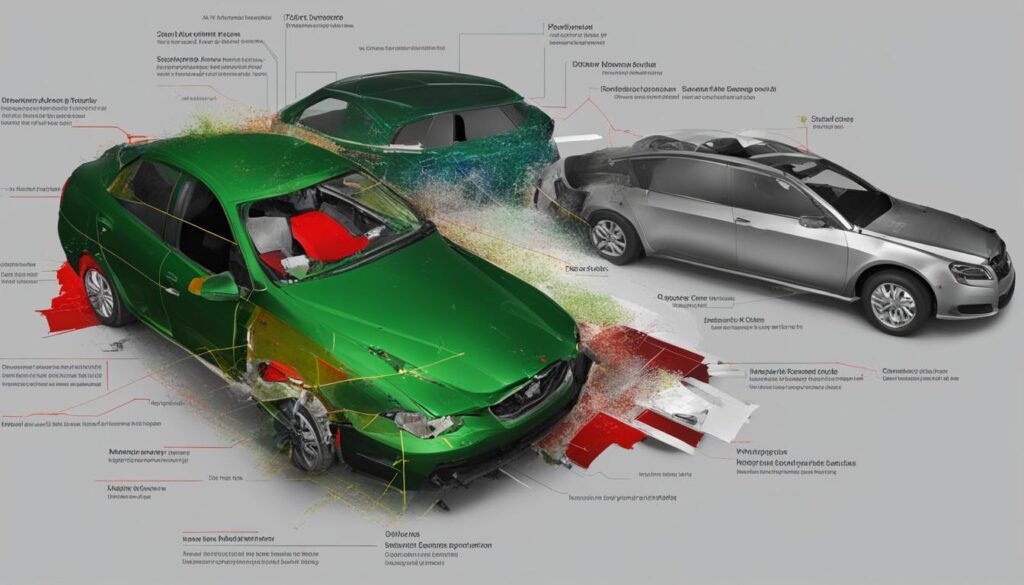In New Zealand, the process of determining whether a car should be written off due to damage involves assessing the cost of repairs in relation to the value of the vehicle. Understanding the criteria and process for writing off a car is essential for car owners and insurance policyholders.
Different factors are taken into account when considering whether a car should be written off, including the extent of the damage, the cost of repairs, and the value of the vehicle. Insurance companies in NZ have specific guidelines and thresholds in place to make this determination.
In this article, we will explore the various aspects of the car write-off process in NZ, including the specific damage costs that are considered and the insurance implications. Understanding these details can help car owners make informed decisions and navigate the claims process more effectively.
Key Takeaways:
- Damage costs are a determining factor in whether a car is written off in NZ.
- Insurance companies have specific thresholds and criteria for write-offs.
- Understanding the write-off process can help car owners navigate claims effectively.
- The value of the vehicle is used to determine the settlement amount.
- Regular maintenance and safe driving can help prevent write-offs.
Car Write-Off Criteria in NZ: Understanding the Factors
When it comes to determining whether a car should be written off in New Zealand, several criteria are taken into account. These include the cost of repairs, the value of the vehicle, and the extent of the damage. Insurance companies have specific guidelines and thresholds for determining when a car is considered a write-off.
Factors Considered for Write-Off Criteria
The criteria for determining a car write-off in NZ typically involve a combination of the following factors:
- Cost of Repairs: Insurance companies assess the cost of repairs compared to the value of the vehicle. If the cost of repairs exceeds a certain percentage of the vehicle’s value, it may be deemed a write-off.
- Value of the Vehicle: The market value of the vehicle is considered when evaluating whether it makes economic sense to repair the car.
- Extent of Damage: The severity of the damage, particularly structural damage, is taken into account. Cars with extensive damage that compromises their safety or structural integrity may be more likely to be written off.
These criteria ensure that insurance companies make informed decisions based on the feasibility and cost-effectiveness of repairs. By considering these factors, insurers can determine whether it is financially viable to repair a car or if it should be written off instead.
Insurance Guidelines and Thresholds
Insurance companies in NZ have specific guidelines and thresholds that they follow to determine write-off criteria. These guidelines may vary between insurers, but they generally revolve around the percentage of repair costs compared to the value of the vehicle.
“With the cost of repairs exceeding 60% of the vehicle’s value, the car is often regarded as a total loss and considered for a write-off.”
Additionally, insurers take into account their own internal policies and guidelines when assessing whether a car should be written off. These may include specific evaluation methods, industry standards, and safety considerations.
Summary of Criteria for Writing Off a Car in NZ
To summarize, the criteria used to determine whether a car should be written off in New Zealand include the cost of repairs, the value of the vehicle, and the extent of the damage. Insurance companies follow specific guidelines and thresholds when assessing write-off eligibility, considering factors such as structural damage and the economic feasibility of repairs.
| Criteria | Factors |
|---|---|
| Cost of Repairs | Percentage of repair costs compared to vehicle value |
| Value of the Vehicle | Market value of the car |
| Extent of Damage | Severity of damage, including structural concerns |
Car Insurance Write-Off Process in NZ: Steps to Follow
When your car is involved in a significant accident or sustains severe damage, the process of writing it off with insurance can seem daunting. However, understanding the steps involved can help guide you through the process. Here’s a breakdown of the car insurance write-off process in NZ:
- Filing a claim: The first step is to contact your insurance company and inform them about the accident or damage. Provide all necessary details, including the date, location, and circumstances of the incident.
- Documenting the damage: To support your claim, gather as much evidence as possible. Take clear photographs of the damage from multiple angles, capturing all relevant details.
- Obtaining repair estimates: Your insurance company may require you to obtain repair estimates from authorized repair shops. These estimates help determine the cost of repairs and whether they exceed the value of the vehicle.
- Evaluating the repair costs: The insurance company will assess the total cost of repairs compared to the value of the vehicle. If the repair costs exceed a certain threshold, typically a percentage of the vehicle’s value, the car may be deemed a total loss.
- Insurance company’s determination: Based on the evaluation of the repair costs and the vehicle’s value, the insurance company will make a decision on whether to write off the car. If it meets the criteria for a write-off, the necessary steps for salvage or disposal will be initiated.
It’s important to note that the specific process may vary slightly depending on your insurance company and policy. However, these general steps provide a framework for understanding the car insurance write-off process in NZ.
Being familiar with the car insurance write-off process can help you navigate through the necessary steps more efficiently. Remember to stay in communication with your insurance company, provide all requested information and documentation promptly, and seek guidance from professionals, if needed.
Car Write-Off Valuations in NZ: Determining the Value
When a car is deemed a write-off, the market value of the vehicle plays a crucial role in determining the settlement amount. Insurance companies rely on various methods to calculate the market value, ensuring a fair and accurate assessment.
One common approach is obtaining valuations from industry databases that provide comprehensive data on car prices and market trends. These databases take into account factors such as the make, model, year, and mileage of the vehicle. They also consider the condition of the car before the write-off incident.
Additionally, insurance companies may utilize guidelines provided by industry organizations to establish fair valuations. These guidelines serve as reference points and help ensure consistency in the valuation process.
It is important to understand how these valuations are determined to ensure a transparent and unbiased settlement. By having a clear understanding of the market value of your vehicle, you can effectively negotiate with the insurance company to obtain a fair compensation.

| Factors Considered in Car Write-Off Valuations | Description |
|---|---|
| Make, Model, and Year | The specific details of the car, including the manufacturer, model name, and the year of production. These factors impact the market value due to factors such as popularity, availability of spare parts, and technology advancements. |
| Mileage | The number of miles the car has traveled. Generally, higher mileage can result in a lower market value, as it indicates more wear and tear on the vehicle. |
| Condition | The overall condition of the car plays a significant role in determining its value. Factors such as the exterior and interior condition, mechanical soundness, and any previous repairs or modifications are taken into consideration. |
| Market Trends | The current demand and supply dynamics of the used car market influence the market value. Factors such as seasonal variations, changes in consumer preferences, and economic conditions can impact the value of the vehicle. |
| Comparable Sales | Sales data from similar cars in the market provide valuable insights into the market value. Insurance companies may assess recent sales of comparable vehicles to determine a fair valuation for the written-off car. |
Threshold for Write-Off in NZ: Cost of Repairs vs. Vehicle Value
In New Zealand, when determining whether a car should be written off, insurance companies rely on a threshold that compares the cost of repairs to the value of the vehicle. This threshold ensures that the insurance company doesn’t spend more on repairs than the car is worth. Typically, insurance companies set a percentage threshold, such as 60% or 75%, which means that if the cost of repairs exceeds that percentage of the vehicle’s value, the car will be considered a write-off.
By having this threshold in place, insurance companies can make a financially sound decision regarding the viability of repairing a damaged car. If the cost of repairs exceeds the threshold, it may not be economically feasible to restore the car to its pre-accident condition.
Calculating the threshold involves comparing the estimated cost of repairs, obtained through repair estimates, with the market value of the vehicle. If the cost of repairs exceeds the predetermined percentage of the vehicle’s value, the car will be deemed a write-off.
“The threshold for write-offs in NZ is based on the cost of repairs versus the value of the vehicle. If the repairs exceed a certain percentage of the vehicle’s value, the car will be written off.”
This threshold is an important factor in determining the fate of a damaged car and plays a crucial role in the insurance claims process. It helps ensure that the insurance company makes a fair decision based on the financial feasibility of repairs.
Car owners and policyholders should be aware of this threshold when assessing the damage to their vehicles and considering whether to file an insurance claim for repairs. Understanding the threshold can help in managing expectations and making informed decisions about the best course of action.
Types of Car Write-Off Categories in NZ: Total Loss vs. Repairable
In New Zealand, car write-offs are classified into two main categories: total loss and repairable. The classification of a write-off car is determined by its condition and the feasibility of repairs based on the extent of damage or cost.
A total loss car is one that is considered beyond repair or economically unfeasible to fix. This could be due to severe damage that compromises the structural integrity of the vehicle or repairs that would exceed the value of the car. In such cases, it is more cost-effective for the insurance company to declare the car as a total loss.
On the other hand, a repairable write-off is a car that can be repaired but is not financially practical to do so. This typically happens when the cost of repairs exceeds a certain percentage of the vehicle’s value, making it uneconomical to invest in repairing the car.
The classification of a write-off car plays a significant role in determining the insurance settlement and the future use of the vehicle. In the case of a total loss, the insurance company will typically take possession of the car and handle its disposal or salvage. In contrast, a repairable write-off may be sold at auction or to a salvage yard, where it can be repaired and resold with the appropriate documentation.
Understanding the different categories of write-off cars in NZ is crucial when dealing with car insurance claims and settlements. It helps policyholders navigate the process and make informed decisions regarding the future of their vehicle.

Note: The image above depicts an example of a damaged car, illustrating the concept of car write-off categories in NZ.
Impact of Write-Off on Car Insurance Premiums in NZ
When a car is written off in New Zealand, it can have an impact on insurance premiums. The effect of a write-off on insurance costs may vary depending on the insurance company and individual circumstances. However, in general, a write-off can result in higher premiums due to the increased risk associated with insuring a vehicle that has been involved in a significant accident.
Insurance companies consider a write-off as an indicator of a higher likelihood of future claims, which can lead to an adjustment in premium rates. This adjustment is typically based on the insurer’s evaluation of the increased risk involved in insuring a vehicle that has sustained extensive damage.
Before filing a claim and proceeding with a write-off process, it is crucial to review and understand the potential impact on insurance premiums. This will help you make an informed decision and assess whether the potential increase in premiums aligns with the value of the vehicle and your overall financial situation.
It’s also worth noting that the impact on insurance premiums may not be permanent. Over time, as you maintain a good claims history and demonstrate responsible driving behavior, there may be opportunities to negotiate lower premiums with your insurance provider.
Remember, each insurance company may have its own policies and guidelines regarding the impact of write-offs on premiums. It’s essential to discuss any concerns or questions you may have with your insurer to ensure clarity and transparency throughout the process.
| Factors Impacting Insurance Premiums After a Write-Off |
|---|
| 1. Severity of the damage |
| 2. Vehicle’s market value |
| 3. Insurance company’s policies |
| 4. Individual claims history and driving record |
Ways to Avoid a Car Write-Off in NZ: Maintenance and Safety Measures
While accidents can happen, there are steps you can take to minimize the risk of your car being written off. By prioritizing regular maintenance and following essential safety measures, you can help keep your vehicle in optimal condition and prevent major damage that might lead to a write-off.
Maintenance Tips to Preserve Your Vehicle
- Schedule regular servicing: Regularly servicing your car helps identify any underlying issues early on and ensures that all components are in good working condition. This preventive maintenance can significantly reduce the risk of sudden breakdowns or extensive damage.
- Perform routine inspections: Conducting regular inspections allows you to catch any potential problems before they worsen. Check the tires, brakes, lights, and fluids periodically to ensure everything is in order.
- Address issues promptly: If you notice any unusual sounds, vibrations, or warning lights, it’s crucial to address them promptly. Ignoring these signs could lead to more severe damage later on.
By following these maintenance tips, you can keep your car in top shape and decrease the chances of it becoming a write-off due to preventable issues.
Safety Measures to Avoid Accidents
- Adhere to road safety rules: Obeying traffic laws and speed limits significantly reduces the risk of accidents. Pay close attention to your surroundings, use turn signals, and maintain a safe following distance from other vehicles.
- Drive cautiously in adverse conditions: In poor weather conditions such as heavy rain, fog, or snow, adjust your driving behavior accordingly. Decrease your speed, use headlights, and be cautious while braking to avoid skidding.
- Avoid risky behavior: Avoid distractions, such as using a mobile phone while driving, as it impairs your concentration. Additionally, refrain from aggressive driving, such as tailgating or sudden lane changes, which can increase the risk of accidents.
By following these safety measures, you can significantly reduce the likelihood of being involved in an accident that could potentially result in a write-off.
| Maintenance Tips | Safety Measures |
|---|---|
| Schedule regular servicing | Adhere to road safety rules |
| Perform routine inspections | Drive cautiously in adverse conditions |
| Address issues promptly | Avoid risky behavior |
Take the necessary precautions and implement proper car maintenance and safety measures to minimize the risk of your car becoming a write-off. By staying proactive with maintenance and being mindful of safety, you can protect yourself, your passengers, and your investment.
Importance of Accurate Car Insurance Information in NZ
When it comes to obtaining car insurance and filing a claim in NZ, accuracy is key. Providing precise and truthful information is crucial to ensure a smooth and fair process. Inaccurate or false details can result in claim denials or even policy cancellations. By disclosing all relevant information, such as modifications made to the vehicle or its intended use, you can ensure that your policy accurately reflects the risk and coverage required.
There are several benefits to providing accurate details in your car insurance:
- Claim Approval: Accurate information increases the likelihood of your claim being approved. Insurance companies rely on accurate data to assess the validity of a claim and determine the appropriate coverage.
- Fair Settlements: Precise information ensures that you receive a fair settlement in the event of a claim. By accurately reporting the condition and features of your vehicle, you can avoid an undervalued settlement that may leave you financially burdened.
- Premium Accuracy: Accurate information also helps maintain the accuracy of your insurance premium. By providing truthful details, you enable insurance companies to calculate premiums that align with the true risk associated with your vehicle.
- Continuous Coverage: Keeping your insurance information up to date and notifying your insurer of any changes is essential to ensure continuous coverage. Accurate information ensures that your policy remains valid and effective.
In summary, accurate car insurance information is of utmost importance in NZ. By providing precise and truthful details, you can avoid claim issues, receive fair settlements, maintain accurate premiums, and ensure continuous coverage. It’s crucial to review your policy regularly, update your information as needed, and communicate any changes to your insurer promptly.
Case Studies: Lessons from Car Insurance Complaints in NZ
A number of car insurance complaints in New Zealand highlight the importance of understanding policy terms, accurately disclosing information, and resolving disputes effectively. These real-life case studies provide valuable insights into common issues faced by policyholders and offer lessons that can help navigate the car insurance process in NZ.
Case Study 1: Car Insurance Claim Dispute
Alice, a car owner in Auckland, filed an insurance claim for a collision with another vehicle. However, the insurance company disputed the claim, stating that Alice failed to disclose a previous accident involving the same vehicle. This case emphasizes the significance of providing accurate and complete information when initially obtaining an insurance policy to avoid claim denials and disputes.
“Accurate information is essential in the insurance process. Failing to disclose previous accidents can lead to claim disputes and potential policy cancellations. It’s vital to be transparent with your insurer to ensure adequate coverage and avoid unnecessary complications.”
Case Study 2: Car Insurance Complaint Resolution
John, a resident of Wellington, encountered difficulties when his insurer undervalued his written-off vehicle. Unsatisfied with the initial settlement offer, John raised a complaint and provided evidence of market value to support his claim. Eventually, through effective communication and negotiation, John reached a fair resolution with the insurer. This case reinforces the importance of advocating for your rights and engaging in constructive dialogue with the insurance company.
“Resolving insurance complaints requires persistence and clear communication. Submitting relevant evidence and maintaining open lines of dialogue can facilitate a satisfactory outcome. Knowing your rights and engaging in a respectful manner can lead to a fair resolution.”
Case Study 3: Car Insurance Problems and Solutions
Sarah, a policyholder from Christchurch, experienced delays and complications during the claim process after her car was vandalized. Frustrated with the prolonged resolution, Sarah sought the assistance of a consumer advocacy group specializing in insurance matters. This case emphasizes the potential benefits of seeking professional advice when facing complex insurance problems.
“Navigating insurance problems can be challenging, especially when faced with delays and uncertainties. Seeking expert advice from consumer advocacy groups or insurance specialists can provide valuable guidance and ensure fair treatment.”
These case studies serve as valuable resources for policyholders in NZ, shedding light on the potential pitfalls and offering insights into the best strategies for resolving disputes and maximizing insurance coverage. By learning from these real-life experiences, individuals can better understand their rights and responsibilities in the car insurance process.
Tips for Dealing with Car Insurance Write-Offs in NZ
Dealing with a car write-off can be a challenging process in NZ. It is important to understand your rights, review your insurance policy, and gather all necessary documentation to support your claim. Seeking professional advice and assistance from a lawyer or insurance expert can also be helpful in navigating the process and ensuring a fair settlement. Additionally, keeping records and photos of the vehicle’s condition before the accident and maintaining open communication with the insurance company can facilitate a smoother resolution.
Conclusion
In conclusion, determining whether a car should be written off in New Zealand involves assessing the cost of repairs in relation to the vehicle’s value. Insurance companies have specific criteria and thresholds for write-offs, and the impact on insurance policies and premiums can vary.
To minimize the risk of a write-off, it is important to take preventive measures such as regular maintenance and adhering to road safety rules. Additionally, providing accurate information when obtaining insurance and filing claims is crucial to ensure a fair settlement and continuous coverage.
Understanding the car insurance write-off process in NZ and seeking professional advice can help navigate the complexities and increase the chances of a successful claim. By being proactive and informed, individuals can minimize the financial and emotional impact of a car write-off.
FAQ
How is the threshold for determining a car write-off in NZ calculated?
The threshold for determining a car write-off in NZ is based on the cost of repairs compared to the value of the vehicle. Insurance companies typically have a percentage threshold, such as 60% or 75%, which means that if the cost of repairs exceeds that percentage of the vehicle’s value, the car will be considered a write-off.
What criteria are used to determine if a car should be written off in NZ?
The criteria for determining whether a car should be written off in NZ include the cost of repairs, the value of the vehicle, and the extent of the damage. Insurance companies consider factors such as structural damage, safety concerns, and economic feasibility of repairs.
What is the process for writing off a car with insurance in NZ?
The process for writing off a car with insurance in NZ involves filing a claim with the insurance company, providing evidence of the damage, obtaining repair estimates, and assessing the total cost of repairs compared to the value of the vehicle. The insurance company will then determine whether the car meets the criteria for being written off and will proceed with necessary steps, such as salvage or disposal of the vehicle.
How are car write-off valuations determined in NZ?
When a car is deemed a write-off in NZ, the market value of the vehicle is used to determine the settlement amount. Insurance companies may use various methods, such as obtaining valuations from industry databases or using guidelines provided by industry organizations, to calculate the market value.
What are the different categories of car write-offs in NZ?
In NZ, there are two main categories for write-off cars: total loss and repairable. A total loss car is one that is considered beyond repair or economically unfeasible to fix due to the extent of the damage or cost of repairs. A repairable write-off is a car that can be repaired but is financially impractical to do so, often due to the high cost of repairs compared to the value of the vehicle.
How does a car write-off impact insurance premiums in NZ?
The impact of a car write-off on insurance premiums can vary depending on the insurance company and individual circumstances. Generally, a write-off can result in higher premiums due to the increased risk associated with insuring a vehicle that has been involved in a significant accident.
What can I do to avoid a car write-off in NZ?
To minimize the risk of a car write-off in NZ, it is important to regularly maintain your vehicle, address any issues promptly, and adhere to road safety rules. Driving cautiously and avoiding risky behavior can also help prevent accidents that could lead to a write-off.
Why is accurate car insurance information important in NZ?
Providing accurate information when obtaining car insurance and filing a claim is crucial in NZ. Inaccurate or false information can result in claim denials or policy cancellations. It is essential to disclose all relevant details, such as modifications made to the vehicle or the intended use, to ensure the policy accurately reflects the risk and coverage needed.
What can we learn from car insurance complaints in NZ?
Car insurance complaints in NZ serve as valuable case studies that highlight the importance of understanding policy terms, accurately disclosing information, and resolving disputes effectively. They provide real-life examples of common issues faced by policyholders and offer insights into how to navigate the car insurance process.
What tips can you provide for dealing with car insurance write-offs in NZ?
When dealing with a car insurance write-off in NZ, it is important to understand your rights, review your insurance policy, and gather all necessary documentation to support your claim. Seeking professional advice and keeping open communication with the insurance company can also be helpful in navigating the process.




